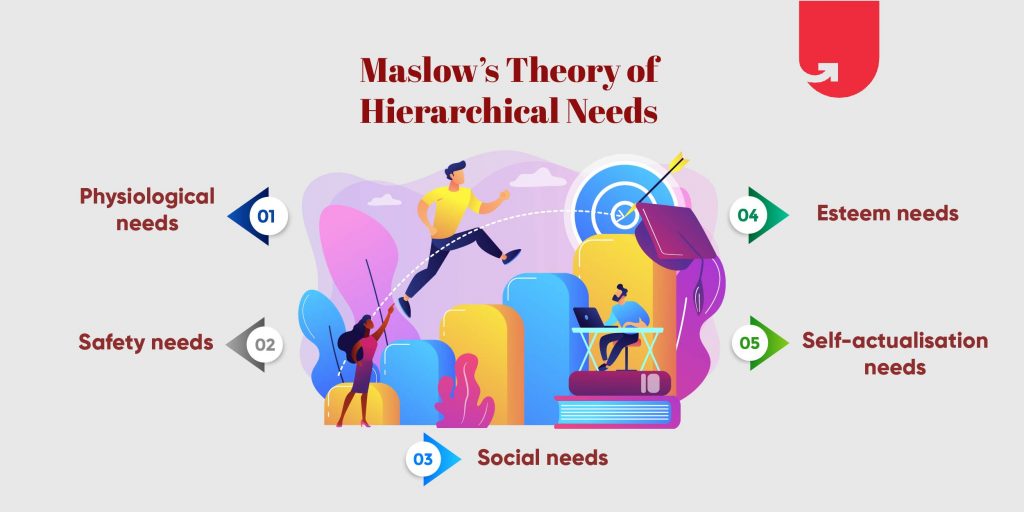Introduction to Motivation Theories
Motivation is a phenomenon that drives our behaviour, thoughts, and emotions. But have you wondered how some people have abundant motivation while others struggle endlessly for an ounce of it? The answer lies in Theories of Motivation.
Motivation theories have practical applications in the workplace, helping employees and managers work towards business goals effectively. By understanding these theories, managers can appropriately support their team members. Furthermore, professionals and management students can also benefit from understanding these theories.
Research suggests that employees motivated in the workplace are 12% more productive than the rest.
So, let’s dive into the world of motivation and understand what is motivation theory.
What are Motivation Theories?
Theories of motivation are like maps that explore why we behave in a certain way and what drives us to pursue our goals. They show us that our needs, desires, and goals all play a role in motivating us.

Think of theories of motivation as a toolbox that we can use to unlock our inner drive and achieve our goals. They give us insights into what motivates us, how we can increase our motivation, and how we can support others to reach their potential.
Many theories of motivation in psychology have been developed over the years, each with its unique perspective on what drives human behaviour. These theories consider various factors, such as –
- Personal needs
- External rewards
- Internal drive
Whether you’re a student, a professional, an athlete, or a manager, understanding motivation theories can help you to achieve your goals and succeed in your endeavours.
Importance of Motivation Theories
Here are some key reasons why various theory of motivation are important:
Understanding Human Behaviour
Motivation theories help us understand why people behave in a certain way and what factors influence their behaviour. By understanding these theories, we can gain insights into our own motivations and behaviours and those of others.
Improving Workplace Productivity
Motivated employees are more productive and engaged in their work. Motivation theories help managers to understand what motivates their team members and how to provide the right incentives to increase motivation and productivity.
Enhancing Personal Growth
By understanding motivation theories, individuals can gain insights into their own motivations and how to increase their drive to achieve personal goals. These theories can help individuals to set and achieve goals and to grow and develop as individuals.
Improving Education Outcomes
Motivation theories can be applied in educational settings to improve student engagement and academic achievement. Teachers can provide appropriate incentives and support to enhance learning outcomes by understanding what motivates students.
Achieving Sports Performance
Motivation theories are essential for athletes and coaches to understand what encourages athletes to perform their best. By applying these theories, coaches can provide the right incentives and support to enhance athlete motivation and performance.
Check out our free courses and upskill yourself.
Maslow’s Hierarchy of Needs Theory
Maslow’s hierarchy of needs is a content-based motivational theory that categorises needs into five levels:
- Physiological needs: The basic needs for survival, such as food, water, shelter, and clothing. An employee’s salary may fulfil their physiological needs in a work setting.
- Safety needs: The need for security and protection. This may align well with an employee’s expectation of job security.
- Social needs: The need for belonging and connection with others. Employees may develop friendships at work, and management can fulfil this need by creating opportunities for bonding.
- Esteem needs: The need for recognition and respect from others. Recognising a professional’s achievements and providing positive feedback can help build their self-esteem.
- Self-actualisation needs: Personal growth and reaching one’s full potential. Employees may try to achieve long-term goals to reach this level, and self-actualised employees can encourage themselves to accomplish workplace goals effectively.
By understanding these needs, managers can motivate employees by fulfilling them through satisfactory pay, job security, social activities, recognition, and growth opportunities. This can create an environment conducive to cooperation and collaboration, leading to better job performance and personal growth.
Learn Management Courses from the World’s top Universities. Earn Masters, Executive PGP, or Advanced Certificate Programs to fast-track your career.
Herzberg’s Two-Factor Theory
Herzberg’s two-factor theory outlines two sets of factors that lead to either satisfaction or dissatisfaction:
Hygiene factors
These relate to the following –
- Working Conditions
- Professional Relationships
- Office Policies
- Rules of Conduct
- Supervisors’ Attitudes
Improving hygiene factors can decrease dissatisfaction and improve motivation among employees.
Motivating factors
These include the following –
- Professional Achievements
- Recognition
- Responsibility
- Career/personal growth.
Addressing motivating factors increases job satisfaction.
To implement this theory, management can reform company policies, offer competitive wages, provide effective supervision and job security, and offer autonomy. Administrative professionals can take a proactive role in employee welfare initiatives, while companies can reduce dissatisfaction by offering professionals a sense of purpose, both professionally and personally.
Our Top Management Programs & Articles
Expectancy Theory
Vroom’s expectancy theory of motivation is a process-based theory where individuals consciously make choices from multiple alternatives. Three factors motivate individuals:
- Expectancy: A belief that harder work leads to greater success.
- Instrumentality: A belief that meeting performance expectations lead to reward.
- Valence: The importance placed on the expected outcome.
According to this theory, achievable tasks may motivate employees to work harder, while unrealistic goals can lead to demotivation. Managers can assess employee understanding of their role in achieving organisational goals and provide training to help align performance with goals.
Self-Determination Theory
Self-Determination Theory is a motivational theory that focuses on the innate psychological needs that drive human behaviour. According to this theory, humans have three innate needs:
- Autonomy: The need to control their own life and decisions.
- Competence: The need to feel capable and effective in their actions and behaviours.
- Relatedness: The need to feel connected to and valued by others.
Self-Determination Theory proposes that individuals are more likely to be motivated when they feel their actions are freely chosen.
Explore our Popular Management Courses
Equity Theory
Equity theory is a process-based motivation theory that focuses on how individuals perceive the fairness of their treatment compared to others. According to equity theory, employees will compare their inputs (e.g. effort, skills, knowledge) and outputs (e.g. salary, benefits, recognition) with their colleagues.
To address equity issues in the workplace, managers can ensure that their employees are compensated fairly. This can help to promote a sense of fairness among employees and increase motivation and job satisfaction.
Comparing and Contrasting Motivation Theories
Let’s compare the abovementioned theories and understand their key differences –
| Theory | Main Idea | Motivational Factors | Limitations |
| Maslow’s Hierarchy of Needs Theory | Individuals have a hierarchy of needs that must be fulfilled. |
| The theory assumes that needs are fixed, that cannot be changed and that everyone follows the same hierarchy. |
| Herzberg’s Two-Factor Theory | Two sets of factors lead to either satisfaction or dissatisfaction in the workplace. Hygiene factors are related to working conditions, while motivating factors are related to personal and professional growth. |
| The theory does not account for individual differences in what motivates employees. |
| Expectancy Theory of Motivation | Motivation involves conscious choices from alternatives. Expectancy is the belief that hard work leads to success. |
| The theory assumes that individuals make rational choices and may not consider emotions or other decision-making factors. |
| Self-Determination Theory | Individuals have innate psychological needs for autonomy, competence, and relatedness, and cause these needs must be fulfilled for motivation. |
| The theory does not account for external factors, such as social or cultural pressures, that may affect motivation. |
| Equity Theory | Individuals compare their inputs and outcomes to those of others, and this comparison determines motivation. | Perception of fairness and equity in comparison to others. | The theory does not account for individual differences in what is perceived as fair or equitable. It may not account for the role of societal or cultural factors in shaping perceptions. |
Other Similar Theories to Learn
Here are a few other motivational theories you may find useful:
Goal-Setting Theory
This suggests that specific and challenging goals lead to higher employee performance and motivation.
Reinforcement Theory
This focuses on how consequences shape behaviour. It suggests that behaviour can be influenced through rewards and punishments.
Self-Efficacy Theory
This theory proposes that an individual’s belief in their ability to succeed in a task or situation influences their motivation and performance.
Cognitive Evaluation Theory
This proposes that extrinsic rewards can decrease intrinsic motivation if perceived as controlling rather than supportive.
Achievement Motivation Theory
This theory suggests that individuals have an innate desire to achieve, which can be influenced by the level of success and failure they have experienced.
Conclusion
Motivation theories are essential for understanding what drives human behaviour and how to create a motivated and engaged workforce. These theories offer valuable insights into the complex nature of motivation. By applying these aforementioned theories in practice, managers and leaders can create a more fulfilling and productive workplace.
The Management Essentials program from upGrad is a great option if you’re looking to enhance your management skills. With case-based learning and live sessions, students will experience positive career development, which will help them grow in all aspects of life.
So what are you waiting for? Enrol now!












































![Salary after BBA: BBA Salaries in India [For Freshers & Experienced in 2023]](/__khugblog-next/image/?url=https%3A%2F%2Fd14b9ctw0m6fid.cloudfront.net%2Fugblog%2Fwp-content%2Fuploads%2F2021%2F04%2F1976-1.png&w=3840&q=75)


